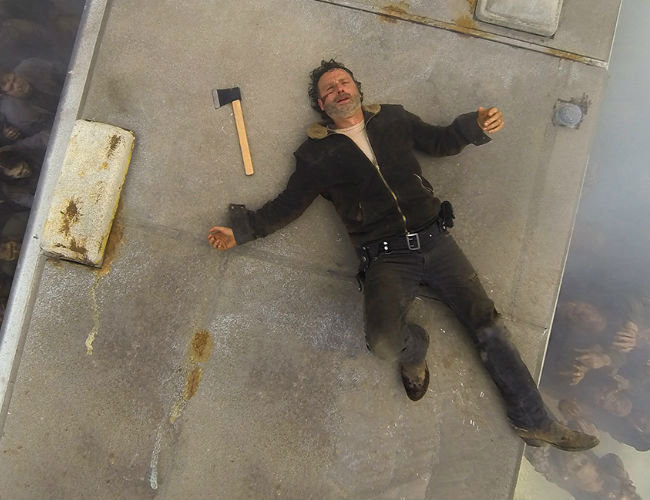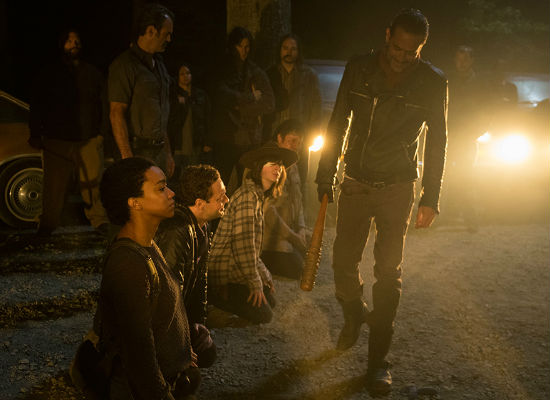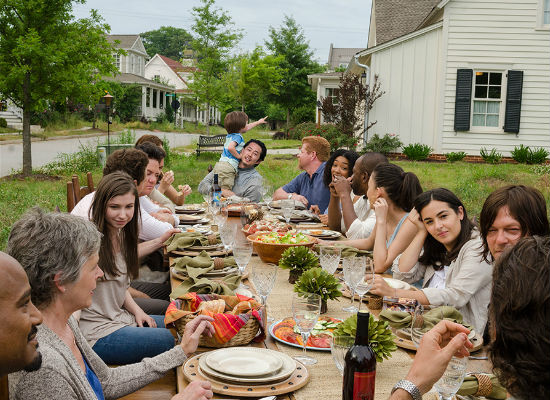
*SPOILERS AHEAD … AND AN ORGIASTIC CELEBRATION OF VIOLENCE SUCH AS YOU”VE NEVER SEEN … AND THE WORST STAND-UP COMEDY EVER*
Ever since Fonzie gunned his motorcycle and sent himself flying over a shark full of tanks in a scene generally recognised as the narrative nadir of Happy Days, “jumping the shark” has come to symbolise the lowest of low points for a TV show, the point from which recovery is rarely possible and the glory days of storytelling and ratings success are well behind it.
While you could well argue that The Walking Dead has flirted with such a state in the past, even as early as season 2 when the inertia of Hershel’s farm becalmed a once-vital narrative machine, AMC’s watercooler hit to end all watercooler hits seemed to evade that fate, leaping effortlessly from ratings high to ratings high, its commitment to examining what happens to humanity in the most inhumane of times, the zombie apocalypse, remaining robustly intact.
But with its stablemate Fear the Walking Dead developing into a clever, nuanced show that dares to wonder if humanity might exhibit both its worst and best characteristics during such a time of crisis, The Walking Dead seems to have finally reached that point where its original raison d’être has been lost in a nasty miasma of violence that seems to exist in its perpetually shocking state.
In other words, a show that once took the time to balance fearful attacks by the ambulatory undead with philosophical musings on the nature of humanity, and whether entertaining the better angels of our nature was a luxury we could collectively no longer afford, has now essentially answered its recurring thesis question.
And the answer is, if you look at the narrative vision of showrunner Scott M. Gimple, who wrote the season 7 opener “The Day Will Come When You Won’t Be”, is that raw, animalistic violence, accompanied by an unremittingly cruel narcissistic and psychopathic violence of the lowest order, is pretty much the only way forward for homo sapiens.
Forget the way people rally together in times of natural disaster, war and pestilence; in the nightmarishly dark world of season 7, any sense of shared humanity is gone, and there is only thuggish victor and the cowed, brutalised vanquished shaking in the face of a worldview so astonishingly nasty that you recoil with every interaction with it.

To be fair, this nihilistically bleak vision of the apocalypse has been promised many times over, with endless discussions between the voices of innate humanity such as Hershel (Scott Wilson) and Dale (Jefferey DeMunn) on one side and the more pragmatic arguments of Rick (Andrew Lincoln) forming the philosophical underpinning of a show that largely regarded killing as something visited upon the undead mostly, the living occasionally but only if necessary, as a way of keeping the existential and physical privations of the apocalypse at bay.
But any sense that this kind of sophisticated worldview survives, that there is regard being paid to its subtle nuance and the cautious optimism that things may get better, all signs to the contrary, was blown royally out of the water by “The Day Will Come When You Won’t Be”.
With new über-bad guy Negan swaggering around holding his bloody barbed-wire wrapped baseball bat Lucille while he delivers an endless diatribe of passive/aggressive verbal haranguing, and the pulped bodies of Abraham (Michael Cudlitz) and Glenn (Steven Yeun) lying in bloody pools in the gravel beneath his feet, it becomes abundantly clear that here was violence not being held aloft as a warning but as a state of being from which there is no escape.
We were promised that things would change in season 7 but that was largely talked about in terms of the world of Rick and the rest of Alexandrians being monumentally expanded by not just Negan and the Saviours existence, but by that of Hilltop and the Kingdom and other communities, many of whom seem to be proving that humanity can return from ultimate adversity.
But even as The Walking Dead talked up this budding return to some form of civilised behaviour, season 7’s opening narrative salvo seemed determined to underline it with scenes devoted to violence so extreme and unnecessary you could only describe it as murder porn.
This is the show for the Trump generation, for people who think that that only solution to any situation is violent retribution and unthinking kneejerk reactions, that humanity sinks to a low point and stays there with survival of the violently fittest the only way forward.
Negan is of course this brave new world’s, or rather cowardly new world (since thuggery and bullying are the insecure asserting their shrivelled-up egos) poster boy, a mono-dimensional bad guy that makes Bond villains look positively fully-formed.
He is almost unbearably cocky, his every utterance meant to intimidate and cower, and yes Rick, who is almost forced to cut off his son’s lower left arm, is most definitely, along with everyone else, reduced to a snivelling, kowtowing mess as dawn rises over their new reality, but as Negan drones one with one menace-laced pronouncement after another you can’t help wondering why anyone would follow him.

Unless violence, as The Walking Dead, now seems to gleefully and bloodthirstily asserts is the only currency in town, the only thing left that determines what will and won’t happen to a person, with no other variables left with any say in the matter.
It’s certainly what Negan promises, haughtily pronouncing unending misery and sadness upon the Alexandrians who are now merely chattels of a madman, worker bees for a psychopath whose only mode of intercourse with those not in his benighted camp is intimidation, death and bloody, soul-crushing violence.
Sure The Walking Dead has been violent in the past but always to an end, there always being some kind of an existential point to things.
But “The Day Will Come When You Won’t Be” jettisoned all that out the narrative window, along with any semblance of nuanced, interesting writing; what we got instead was a celebration of violence for violence sake, shock value and Roman circus brutality elevated while any storyline subtlety and veneration for humanity’s proven ability to stay largely human, even in the very worst of circumstances, was consigned to the narrative dustbin.
Season 7 has begun with lazy writing, ceaselessly, nasty murder porn and a hefty dose of unsophisticated emotional manipulation, rendering whatever the point of the series was moot and offering up instead a shark being jumped over as Negan, declaring humanity’s flawed quest for hope and happiness over for the duration, swung his bat to pound it into a bloody, largely irrelevant, darkly pointless pulpy mess.
- Things may look up next week in the “The Well” where we catch up with Morgan (Lennie James) and Carol (Melissa McBride) at the Kingdom and find out whether the idiosyncrasies of Ezekiel (Khary Payton) and his tiger are any match for Negan’s deathly empty view of the universe …